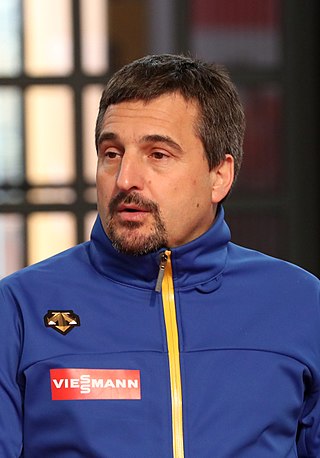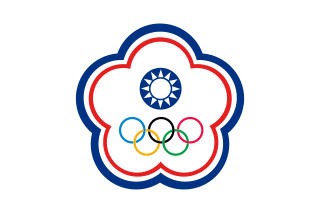
A luge is a small one- or two-person sled on which one sleds supine (face-up) and feet-first. A luger begins seated, propelling themselves initially from handles on either side of the start ramp, then steers by using the calf muscles to flex the sled's runners or by exerting opposite shoulder pressure to the pod. Racing sleds weigh 21–25 kg (46–55 lb) for singles and 25–30 kg (55–66 lb) for doubles. Luge is also the name of an Olympic sport that employs that sled and technique.

Georg Hackl, often named Hackl Schorsch, is a German former luger who was three time Olympic and World Champion. He is known affectionately as Hackl-Schorsch or as the Speeding Weißwurst, a reference to what he looks like in his white bodysuit coming down the luge at fast speeds.

Venezuela sent a delegation to compete at the 2006 Winter Olympics in Turin, Italy from 10 to 26 February 2006. This was the third time Venezuela had competed at a Winter Olympic Games. The Venezuelan delegation consisted of one luge athlete, Werner Hoeger. He finished 32nd in his only event, the men's singles.

India sent a delegation to compete at the 2006 Winter Olympics in Turin, Italy from 10–26 February 2006. This was the nation's seventh appearance in a Winter Olympic Games. The Indian delegation consisted of four athletes, two in alpine skiing, one in cross-country skiing, and one in luge. Their best performance in any event was 25th by luger Shiva Keshavan in the men's singles.
Gerda Weissensteiner OMRI is an Italian luger and bobsleigh pilot who competed from the late 1980s to 2006. Competing in six Winter Olympics, she won the gold medal in the women's singles luge event at the 1994 Winter Olympics in Lillehammer, and together with Jennifer Isacco she won the bronze in Turin in the two-woman bobsleigh at the 2006 Winter Olympics. She was the first Italian sportsperson to win Olympic medals in two disciplines.

Bermuda sent a delegation to compete at the 2002 Winter Olympics in Salt Lake City, United States from 8–24 February 2002. This was Bermuda's fourth appearance at a Winter Olympic Games. The delegation consisted of a single competitor, luge racer Patrick Singleton. This was his second Olympics, and he finished his event in 37th place.

Venezuela sent a delegation to compete in the Winter Olympic Games for the first time at the 1998 Winter Olympics in Nagano, Japan from 7–22 February 1998. The delegation consisted of a single luge competitor, Iginia Boccalandro. In the women's singles she came in 28th place out of 29 competitors.

Anna-Maria Müller was an East German luger who competed in the late 1960s and early 1970s. She won the gold medal in the women's singles event at the 1972 Winter Olympics in Sapporo. At the previous Winter Olympics in Grenoble, she initially finished second after the competition was halted to three runs due to bad weather, but was disqualified with her East German teammates Ortrun Enderlein and Angela Knösel when it was discovered that they had illegally heated their runners. Enderlein, who was leading at the time, and Müller were stripped of their respective medals as a result.
Angelika Neuner is an Austrian luger who competed from 1987 to 2002. Competing in four Winter Olympics, she won two medals in the women's singles event with a silver in 1992 and a bronze in 1998. Her younger sister, Doris, won the gold medal in the same event at Albertville in 1992.

The Whistler Sliding Centre is a Canadian bobsleigh, luge, and skeleton track located in Whistler, British Columbia, that is 125 km (78 mi) north of Vancouver. The centre is part of the Whistler Blackcomb resort, which comprises two ski mountains separated by Fitzsimmons Creek. Located on the lowermost slope of the northern mountain, Whistler Sliding Centre hosted the bobsleigh, luge, and skeleton competitions for the 2010 Winter Olympics.
The FIL European Luge Championships 2010 took place 19 – 24 January 2010 in Sigulda, Latvia for the second time, hosting the event previously in 1996.
The luge competition events of the 2010 Winter Olympics were held between 13 and 17 February 2010 at the Whistler Sliding Centre in Whistler, British Columbia, Canada.
The men's luge at the 2010 Winter Olympics took place on 13–14 February 2010 at the Whistler Sliding Centre in Whistler, British Columbia. Germany's Felix Loch was the two-time defending world champion and won the gold medal with the fastest time in each of the four runs. The test event that took place at the venue was won by Germany's David Möller, who would win the silver medal in this event. Italy's Armin Zöggeler was the two-time defending Olympic champion and won a bronze medal in this event. The last World Cup event prior to the 2010 games took place in Cesana, Italy on 30 January 2010 and was won by Zöggeler, who also won the overall World Cup title.

The women's luge at the 2010 Winter Olympics in Vancouver, Canada took place on 15–16 February at the Whistler Sliding Centre in Whistler, British Columbia. Germany's Sylke Otto was the two-time defending Olympic champion. Otto retired midway through the 2006-07 season in January 2007 to pregnancy and after suffering a crash at the track in Königssee, Germany. Erin Hamlin of the United States was the defending world champion. The test event that took place at the venue was won by Germany's Natalie Geisenberger. The last World Cup event prior to the 2010 games took place in Cesana, Italy on 31 January 2010 and was won by Geisenberger. Geisenberger's teammate Tatjana Hüfner, the defending Olympic bronze medalist, won the overall World Cup for 2009-10 season in women's singles.
The doubles luge event at the 2010 Winter Olympics was held on 17 February at the Whistler Sliding Centre in Whistler, British Columbia. Twenty teams participated. Austrian brothers Andreas and Wolfgang Linger, the defending Olympic and European champions, won the gold medal. The silver medal was also won by a pair of brothers, Andris and Juris Šics of Latvia. Germans Patric Leitner and Alexander Resch clinched the bronze medal after edging out Italians Christian Oberstolz and Patrick Gruber, who were in third place after the first run.

Chinese Taipei sent a delegation to compete at the 2010 Winter Olympics in Vancouver, British Columbia, Canada from 12–28 February 2010. Although the nation is known as Taiwan or the Republic of China, the International Olympic Committee mandates that the Chinese Taipei Olympic Committee flag and name is used, and not the flag of Taiwan, as per the Nagoya Resolution, which Chinese Taipei accepted in 1981. This was Chinese Taipei's eighth time participating in the Winter Olympic Games. The Chinese Taipei delegation consisted of a single athlete, luger Ma Chih-hung. He finished 34th in the men's singles event.
The men's luge at the 2002 Winter Olympics began on 10 February, and was completed on 11 February at Utah Olympic Park.

Tonga sent a delegation to compete at the 2014 Winter Olympics in Sochi, Russia from 7–23 February 2014. This was the Pacific island nation's debut at the Winter Olympic Games. The Tongan delegation consisted of one luge athlete, Bruno Banani, who had changed his name in a marketing gimmick to match that of German brand Bruno Banani. In his event, the men's singles, he came in 32nd place out of 39 competitors.
The Women's singles luge competition at the 1968 Winter Olympics in Grenoble was held from 11 to 13 February, at Villard-de-Lans.











